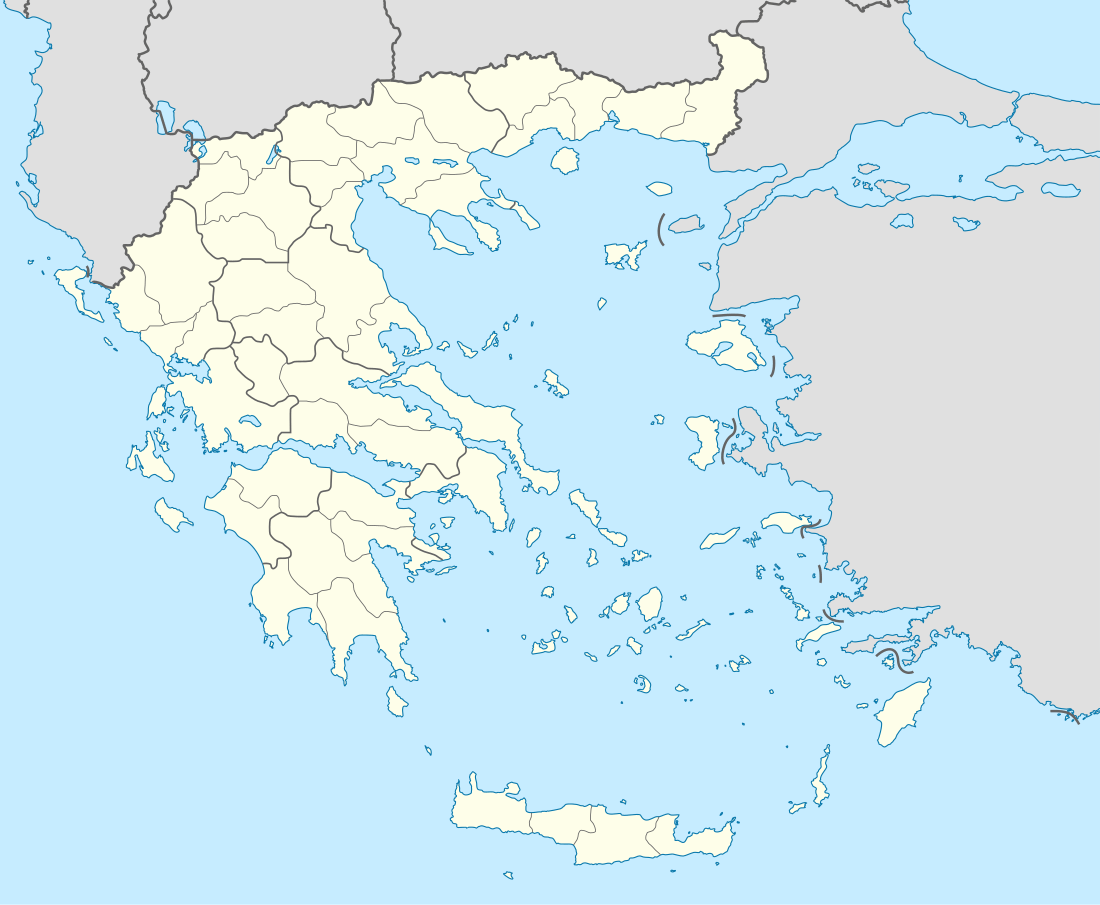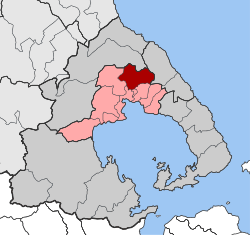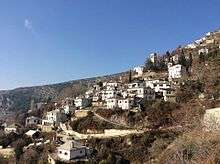Makrinitsa
Makrinitsa (Greek: Μακρινίτσα), nicknamed "balcony of Mt. Pelion," is a village and a former community in Magnesia, Thessaly, Greece. Since the 2011 local government reform it is part of the municipality Volos, of which it is a municipal unit.[2] The municipal unit has an area of 59.903 km2.[3]
Makrinitsa Μακρινίτσα | |
|---|---|
Makrinitsa square | |
 Makrinitsa Location within the regional unit  | |
| Coordinates: 39°24′N 22°59′E | |
| Country | Greece |
| Administrative region | Thessaly |
| Regional unit | Magnesia |
| Municipality | Volos |
| • Municipal unit | 59.9 km2 (23.1 sq mi) |
| Elevation | 600 m (2,000 ft) |
| Population (2011)[1] | |
| • Municipal unit | 694 |
| • Municipal unit density | 12/km2 (30/sq mi) |
| Time zone | UTC+2 (EET) |
| • Summer (DST) | UTC+3 (EEST) |
| Postal code | 370 11 |
| Area code(s) | 24280 |
| Vehicle registration | ΒΟ |
| Website | http://www.makrinitsa.gr |
Name
The name is first attested in the early 13th century through the Makrinitissa Monastery. "Makrinitissa" itself is a more scholarly form of "Makrinitsa", which must have been the colloquial name even at the time. It is of Slavic origin, originally Mokrinitsa, a diminutive form of Mokrina, "wet place", referring to the water-rich environs of the village. The name was Hellenized with the change of the first vowel to "a" from the Greek word makrys, "long".[4]
Location
It is situated in the northwestern part of the Pelion mountains, 6 km northeast of Volos. One of the most characteristic traditional settlements, full of mansions and houses that look like hanging ornaments on the green mountain side. One of the traditional coffee houses is decorated with a fresco by the famous Greek painter Theofilos. The picturesque cobbled paths of Makrinitsa are scattered with traditional water fountains. Makrinitsa is a popular tourist destination, especially during the winter.
The village is the home of the Museum of Folk Art and History of Pelion, housed in the historic Topali Mansion, with over 1,500 objects related to the folk culture and everyday life of the region.[5]
Historical population
| Year | Population |
|---|---|
| 1981 | 546 |
| 1991 | 651 |
| 2001 | 898 |
| 2011 | 694 |
Gallery
 Makrinitsa as seen from Portaria
Makrinitsa as seen from Portaria- Makrinitsa
- Makrinitsa in autumn
- Central Makrinitsa
- Central Makrinitsa
- General view of the village
- View of a traditional house
References
- "Απογραφή Πληθυσμού - Κατοικιών 2011. ΜΟΝΙΜΟΣ Πληθυσμός" (in Greek). Hellenic Statistical Authority.
- Kallikratis law Greece Ministry of Interior (in Greek)
- "Population & housing census 2001 (incl. area and average elevation)" (PDF) (in Greek). National Statistical Service of Greece. Archived from the original (PDF) on 2015-09-21.
- Giannopoulos, N. I. (1924). "Αι παρά την Δημητριάδα Βυζαντιναί μοναί". Ἐπετηρίς Ἐταιρείας Βυζαντινῶν Σπουδῶν (in Greek). 1: 210–240.
- "Pelion Museum of Folklore and History", discoverpelio.com, archived from the original on 2016-03-15, retrieved 2016-01-15
External links
| Wikimedia Commons has media related to Makrinitsa. |